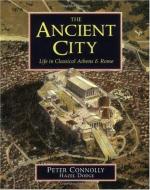
|
| Name: _________________________ | Period: ___________________ |
This test consists of 15 multiple choice questions and 5 short answer questions.
Multiple Choice Questions
1. In 487 BC, laws are passed that dictate candidates for archonship must be chosen in this manner, instead of being elected.
(a) By assembly.
(b) By chance.
(c) By lot.
(d) By an election of kings.
2. This covered building is erected for the Panathenaic Games when Pericles decides to include musical events.
(a) Fourth century stoa.
(b) Temple of Dionysus.
(c) Odeon.
(d) Dorpfeld Theater.
3. These allow state payments to be made for performance of civic duty, thereby allowing the poor to participate in politics.
(a) Taxes.
(b) The Boule and tributes.
(c) Tributes and levies.
(d) The Boule and levies.
4. The athletic events are intended to train men for this.
(a) War.
(b) Farming.
(c) Sports.
(d) Gladiator fights.
5. Priestesses answer practical questions of the present and future here.
(a) Eleusis.
(b) Telesterium.
(c) Apollo at Delphi.
(d) Clepsydra Fountain.
6. What is the only crime in Athens for which a woman can divorce her husband?
(a) Theft.
(b) Continued abuse.
(c) Murder.
(d) Adultery.
7. In 480 BC, a huge army under this Persian king breaks through the Spartan army at Thermopylae, and attacks Athens.
(a) Pisistratus.
(b) Themistocles.
(c) Xerxes,
(d) Erechtheus.
8. In 404 BC, these defense tools are demolished in a peace agreement.
(a) Canons.
(b) Long Walls.
(c) Arsenals.
(d) Ballistas.
9. Much of the Greek clothing is made from this.
(a) Wool.
(b) Leaves.
(c) Cotton.
(d) Animal hair.
10. The final day of the festival is devoted to this.
(a) A feast.
(b) Prizes.
(c) Races.
(d) Sacrifice.
11. To stave off future attacks, the Athenians build this to help protect their city.
(a) A bridge.
(b) A large gunship.
(c) A wall.
(d) A cannon.
12. The Panathenaic Games are only for these people.
(a) Slaves.
(b) All Greeks.
(c) Athenians.
(d) Women.
13. These are used to channel water to the city of Athens.
(a) Glass pipes.
(b) Gold ditches.
(c) Metal pipes.
(d) Clay pipes.
14. Ancient walls around the city are believed to have been built in ____.
(a) 8th century AD.
(b) 5th century BC.
(c) 6th century BC.
(d) Both 5th and 6th century BC.
15. This event consists of discus, long jump, javelin, sprinting, and wrestling.
(a) Panathenaic.
(b) Panhellenic.
(c) Pentathlon.
(d) Triada.
Short Answer Questions
1. What is / are the most common forms of punishment in ancient Athens?
2. This is the best known storehouse for the equipment of the large Athenian navy.
3. _______ is the god of wine and emotion.
4. It is estimated that the total Athenian military strength is around this many soldiers.
5. At the age of eighteen, Athenian boys must attend this.
|
This section contains 403 words (approx. 2 pages at 300 words per page) |

|




